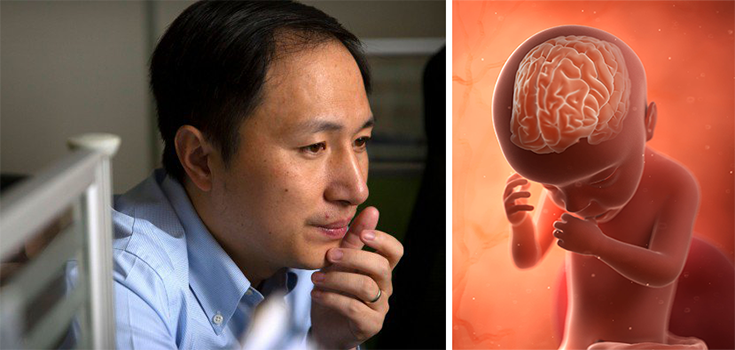Designer Babies: Did Scientist Make Gene-Edited Twins Smarter on Purpose?

Gene editing in a sense can be exciting, but it’s scary too. One of the core concerns surrounding gene-edited human embryos is the potential for “designer babies.” These designer babies could theoretically be made smarter and more attractive than babies created naturally, further widening the chasm between the haves and the have-nots. But what you may not have known is that this may have already happened, and it’s unclear whether it was done intentionally or unintentionally.
In November, we reported on the case of Chinese researcher He Jiankui, who claimed he had edited the embryos of twin girls to make them resistant to HIV, the virus that causes AIDS. The embryos were implanted in their mother’s womb and she carried them to term, giving birth to reportedly healthy babies
Shock and outrage immediately spread throughout the scientific community and the world. Jiankui broke major taboos when he allowed the embryos to be implanted. When human embryos are edited using CRISPR-Cas9 technology, they must be destroyed after a few days and may only be used for research purposes.
He was later detained by Chinese authorities and could face the death penalty for his work.
Study: CRISPR Gene-Editing Ignites Tons of Unintentional Genetic Mutations
There is a concern now that using CRISPR, the scientist may have also edited the girls’ brains in a way that makes them smarter.
Jiankui, with the help of UCLA neurobiologist Alcino J. Silva, edited the girls’ DNA to make them resistant to HIV by disabling a gene called CCR5. They wrote in a report published in the journal Cell that people without the CCR5 gene may recover more quickly from a stroke or traumatic brain injury. Those who are naturally missing the gene also tend to stay in school longer.
Researchers at UCLA are currently conducting a trial to determine if the anti-HIV drug Maraviroc, which blocks CCR5 chemically, can improve cognition in people with HIV, which can cause memory issues. HIV uses CCR5 as a gateway to the body.
Silva said their experiments showed that disabling CCR5 in mice made them smarter, but it’s not clear if Jiankui was deliberately attempting to increase the twin girls’ intelligence. Silva claims that was not his intention. However, he said it is likely that ‘the girls will be more intelligent.’
“The answer is likely yes, it did affect their brains. The simplest interpretation is that those mutations will probably have an impact on cognitive function in the twins.”
He said that it’s impossible to know at this point what that might mean, but “that is why it should not be done.”
Silva now regrets his role in the research and fears what it could mean for the future. He said that his research often puts him in touch with top Silicon Valley figures whom he suspects have an unhealthy interest in designer babies with superior intelligence. When he learned of the twins’ birth, he immediately wondered if Jiankui had deliberately attempted to boost the girls’ cognitive abilities.
“I suddenly realized – Oh, holy shit, they are really serious about this bullshit. My reaction was visceral repulsion and sadness.”
During a summit of gene-editing scientists that occurred 2 days after the birth announcement in Hong Kong, Jiankui admitted that he was well aware of the potential brain effects from the UCLA research, but told those gathered that he was “against using genome editing for enhancement.”
Read: World Health Organization to Study Gene Editing Amid Controversial Developments
Silva said:
“Could it be conceivable that at one point in the future we could increase the average IQ of the population? I would not be a scientist if I said no. The work in mice demonstrates the answer may be yes. But mice are not people. We simply don’t know what the consequences will be in mucking around. We are not ready for it yet.”
Sources:
[1] Engadget
